Archive for the ‘WCS’ Category
Perry Donor’s Radioactive Waste Site Deal Scrutinized
September 15, 2011
by PETER OVERBY
All Things Considered
NPR
| Listen to the Story | |
| All Things Considered [4 min 58 sec] | |
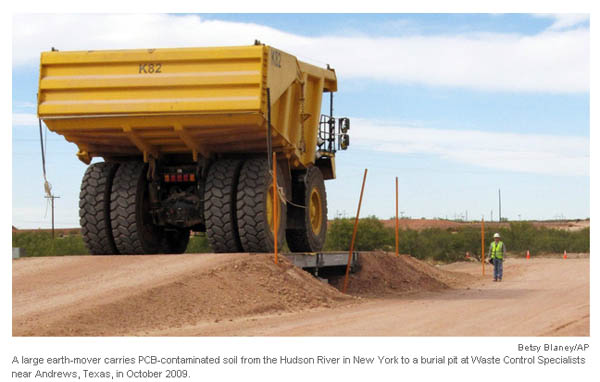
Presidential candidate Rick Perry’s ties to campaign donors came under more scrutiny this week when he was challenged during Monday’s Tea Party debate.
Perry defended taking a contribution from a drug company and then mandating use of the company’s new vaccine. “I raised about $30 million, and if you’re saying I can be bought for $5,000, I’m offended,” he said.
Actually, the drug company, Merck, has given Perry $28,500 overall. But that’s still pocket change compared with what Perry’s truly big donors have given.
In his career as governor of Texas, a state where millionaires are plentiful and contribution limits are lax, Perry has raised about half his campaign cash from just 204 big donors, according to an analysis by the watchdog group Texans for Public Justice. And his administration has helped many of those donors, even when it comes to disposing of radioactive waste.
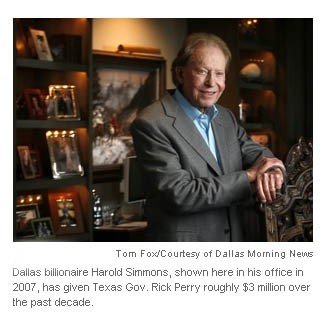
‘The Wheels Have Been Greased’
Perry donor Harold Simmons, an 80-year-old billionaire, is a political player. He gave millions of dollars to Swift Boat Veterans for Truth in 2004, financing ads that knee-capped Democratic presidential nominee John Kerry.
For Perry, Simmons has anted up roughly $3 million worth of support over the past decade — some of the money going to Perry’s campaign committee, other dollars going to the Republican Governors Association when Perry was fundraising for it.
Simmons also owns Waste Control Specialists LLC, working in the heavily regulated industry of radioactive waste disposal.
Craig McDonald, of Texans for Public Justice, says those two facts go together.
“There has been no secret that Harold Simmons’ direct self-interest lies in building, permitting and operating his hazardous waste dump and low-level nuclear waste dump in West Texas,” he says. “And the wheels have been greased at every turn.”
An Environmental Review
In 2003, the Texas Legislature took the state-run radioactive waste program and made it a private monopoly for Waste Control Specialists. Simmons later bragged about the lobbying that accomplished that.
Waste Control Specialists owned the site in West Texas. But it needed an environmental review. A panel of eight state employees fended off corporate lobbyists and the Perry administration for four years to produce their report.
“We knew from the beginning that this permit was intended to be issued,” says Glenn Lewis, who was on the panel.
And they understood why.
“The realization that Harold Simmons was a top campaign contributor to Gov. Perry,” Lewis says.
Despite that, the panel said that radioactive waste should not be buried so close to big aquifers.
“I am frankly surprised even now that a team of engineers and geologists, knowing what the political expectations were, still worked up the nerve to say, ‘No, it’s not safe,’ ” Lewis says.
Getting A License
Next, Waste Control Specialists needed license approval from the Texas Commission on Environmental Quality. All three commissioners were Perry appointees. The commission chose to ignore the environmental review.
One of the commissioners, Larry Soward, says complaints were pouring in. He thought a public hearing was called for. The other two commissioners said no.
“They voted to issue the license without sending it to a hearing, and I voted against that,” Soward says.
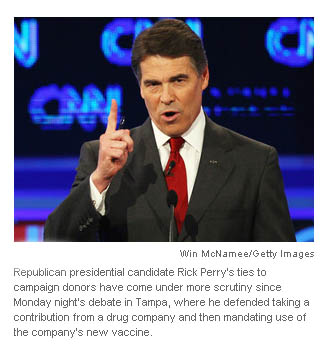
In the end, the commission gave the go-ahead to Waste Control Specialists. The commission’s top staffer joined the company as a lobbyist. Lewis quit his job. Soward didn’t seek another term on the commission.
Soward says he’s still bothered by the lack of any public hearing.
“I think that generations to come are going to have a real problem from that site that they’re going to have to deal with,” he says.
A Nationwide Scale
Up to this point, Waste Control Specialists had been developing a small facility — one where Texas, one other state and the federal government could bury low-level radioactive waste.
But a corporate report lays out a vision unique in this country: “one-stop shopping” for the entire nation’s hazardous, toxic and radioactive waste. It would cover more than 20 square miles.
At an oversight hearing last year, CEO Bill Lindquist said the business plan needs that nationwide scale.
“It’s the Cadillac of facilities,” Lindquist said, “which is wonderful for the state of Texas, but it’s very expensive, and the cost to construct it and operate it and license it is a lot more than what was contemplated in 2003.”
In January, the Texas Legislature said Waste Control Specialists can import radioactive waste from 34 additional states.
Perry’s spokesman didn’t respond to requests for comment.
Chuck McDonald, a spokesman for Waste Control Specialists, says the environmental concerns are exaggerated.
“That is the most geologically tested plot of land on planet Earth,” he says.
Equally exaggerated, McDonald says, are the suggestions that Simmons’ campaign money bought Perry’s support.
“The criticism of the governor — it’s all unfounded. The notion that we’ve somehow benefited is laughable,” he says.
Simmons is now fostering Perry’s White House ambitions. This summer he gave $100,000 to a group that rallied Perry supporters for Iowa’s straw poll. (Perry did not compete in the poll; he ended up announcing his candidacy the same day in South Carolina.)
Back in 2006, Simmons told the Dallas Business Journal that one of the most influential things for business success is “the policy of the federal government.”
This document contains copyrighted material whose use has not been specifically authorized by the copyright owner. SEED Coalition is making this article available in our efforts to advance understanding of ecological sustainability, human rights, economic democracy and social justice issues. We believe that this constitutes a “fair use” of the copyrighted material as provided for in section 107 of the US Copyright Law. If you wish to use this copyrighted material for purposes of your own that go beyond “fair use”, you must obtain permission from the copyright owner.
Officials prepare for opening of radioactive waste facility
November 10, 2011
BY JON VANDERLAAN
OA Online
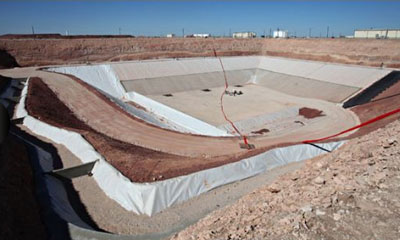
The radioactive waste disposal facility outside of Andrews, the first of its kind in Texas and one of three in the United States, celebrated its ribbon cutting Thursday.
Rod Baltzer, president of Waste Control Specialists, which operates the low-level radioactive waste disposal facility in Andrews County, said he’s been with the company since 1998, just three years after it began its involvement in the project.
"It’s a tremendous accomplishment," he said of the first facility in the United States that is licensed with the Nuclear Regulatory Commission for disposing of the low-level radioactive waste.
Regularly, radioactive waste is transported from holding facility to holding facility without actually being disposed, but the Andrews facility will take waste from 36 states around the country.
WCS Vice President Linda Beach said the standards upheld by the facility are much higher than previous radioactive waste disposal facilities.
"Some say we’re going to contaminate the Ogallala Aquifer," she said. "Science, technology and logic is not going to sway them because of what they believe."
In fact, she said, the facility is 10 miles away from the aquifer and will never threaten to contaminate the source.
Not only are the Texas Commission on Environmental Quality and other agencies constantly checking up on the facility, but several layers of protection in the way of concrete, grout and red bed clay keep radioactive materials from the outside.
The project is also tightly intertwined with the Texas government, which owns the land and will be pulling in tax revenue from in- and out-of-state companies that dump at the site.
Baltzer said the site will begin taking radioactive material at the commercial landfill in January. It already takes radioactive waste at a federal landfill and takes radioactive byproduct, all on the same site.
This document contains copyrighted material whose use has not been specifically authorized by the copyright owner. SEED Coalition is making this article available in our efforts to advance understanding of ecological sustainability, human rights, economic democracy and social justice issues. We believe that this constitutes a "fair use" of the copyrighted material as provided for in section 107 of the US Copyright Law. If you wish to use this copyrighted material for purposes of your own that go beyond "fair use", you must obtain permission from the copyright owner.
Meet the Shady Dallas Mega-Billionaire Industrialist Pouring Money into Rick Perry’s Coffers
August 29, 2011
By Joe Conason
AlterNet
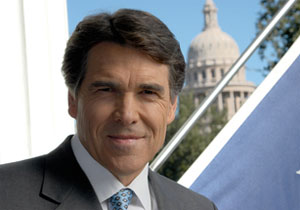
Most Americans have never heard of Harold Simmons, despite his fantastic wealth, because he wisely keeps his head low.
Like so many Republican officials of the tea party persuasion, Rick Perry despises the Environmental Protection Agency-a feeling he has expressed repeatedly in speeches, lawsuits, legislation and even a book titled "Fed Up!" Perhaps that is only natural for the governor of Texas, a "dirty energy" state where the protection of air, water and human health rank well below the defense of oil company profits for most politicians.
But Perry has at least one other reason for smacking down those bureaucrats so eagerly. When environmental regulators do their job properly, that can mean serious trouble for Perry’s largest political donors.
The outstanding example is Harold Simmons, a Dallas mega-billionaire industrialist who has donated well over a million dollars to Perry’s campaign committees recently. With Perry’s eager assistance-and despite warnings from Texas environmental officials-Simmons has gotten approval to build an enormous radioactive waste dump on top of a crucial underground water supply.
"We first had to change the law to where a private company can own a license, and we did that," Simmons boasted in 2006, after the Texas Legislature and the governor rubber-stamped initial legislation and approvals for the project. "Then we got another law passed that said (the state) can only issue one license. Of course, we were the only ones that applied."
Most Americans have never heard of Simmons, despite his fantastic wealth, because he wisely keeps his head low, generally refusing press interviews and avoiding media coverage. Last year, a local monthly in his hometown published the headline "Dallas’ Evil Genius" over a scathing and fascinating investigative profile that examined not only the peculiar history of litigation between Simmons and his children (who no longer speak to him), but his political machinations, corporate raiding and continuing corporate penchant for pollution.
In D magazine, reporter Laray Polk explained how Simmons and a company he owns-innocuously named Waste Control Systems-manipulated state and federal law to allow him to build a nuclear-waste disposal site in West Texas. But construction has been delayed for years in part because the site appears to overlay the Oglalla Aquifer, an underground water supply that serves 1.9 million people in nine states, raising obvious concerns over radioactive contamination. In the Simmons profile and subsequent posts on the Investigative Fund website last year, Polk explored the controversy over the proposed WCS facility, including strong objections by staff analysts at the Texas Commission on Environmental Quality who found evidence that atomic waste might indeed leach into a huge pool of drinking water.
Now reporters for The Los Angeles Times have revived, advanced and updated the WCS story with much additional detail, including interviews with the Texas environmental officials who oversaw the approval process for the facility. For a period last summer, that process appeared to have been slowed down to allow serious consideration of the scientific data collected by the commission’s staff.
In other words, the regulators were trying to do their job, which meant expensive delays and perhaps an eventual ruling against the nuclear waste site. That would have protected the Oglalla Aquifer and cost Simmons hundreds of millions in lost investment and profit. But then Perry’s appointees on the commission voted by two to one to issue licenses for the WCS site.
This year, officials on another Texas commission appointed by Perry-who oversee low-level radioactive waste in the state-voted to allow the WCS site to accept nuclear waste from 34 other states in a highly controversial decision later ratified by the state Legislature and signed by Perry himself. Not long after that, according to The Los Angeles Times’ report, Simmons gave $100,000 to Americans for Rick Perry, an "independent" committee supporting his presidential candidacy. (Back in 2004, Simmons was a major contributor to another "independent" political committee, the notorious Swift Boat Veterans group that distorted Democratic presidential nominee John Kerry’s war record in a series of TV ads.)
According to a spokesman for WCS, the Texas governor’s happy and lucrative relationship with Simmons did nothing to help the company except to turn the billionaire into "an easy target. … It made the state redouble its efforts to be thorough." But the Texas officials who opposed the approval on principle have since quit their jobs with the state. As one of them told the L.A. Times reporters, "This is a stunningly horrible public policy to grant a license to this company for that site … . Something had to happen to overcome the quite blatant shortcoming of that application. … The only thing I know in Texas that has the potential to do that is money in politics."
As for the Texas official (and Perry appointee) who overruled his own scientists and approved the deal, he left state government, too-to work as a lobbyist for Simmons. He says that no undue influence led to the favorable outcome for his new employer.
Texas must be the only place on earth where anyone would believe that.
Joe Conason is the editor in chief of NationalMemo.com.
© 2011 Creators.com
This document contains copyrighted material whose use has not been specifically authorized by the copyright owner. SEED Coalition is making this article available in our efforts to advance understanding of ecological sustainability, human rights, economic democracy and social justice issues. We believe that this constitutes a "fair use" of the copyrighted material as provided for in section 107 of the US Copyright Law. If you wish to use this copyrighted material for purposes of your own that go beyond "fair use", you must obtain permission from the copyright owner.
Milton Lee returns as Perry’s dump pick
September 21, 2011
San Antonio Current Blog – The Que Que
Remember when we suggested Rick Perry was looking for stooges to help turn one of his top funder’s nuclear dumps into a national enterprise? Well, he had to look no further than former CPS Energy CEO Milton Lee. Perry’s new appointments to the state commission governing the two-state Texas-Vermont Low-Level Radioactive Waste Disposal Compact Commission, announced last week, brought in a slate of new faces who will help determine the future of radioactive-waste dumping in Texas — and how much Dallas billionaire Perry donor Harold Simmons will make on the state’s favored Waste Control Specialists’ site in Andrews County.
Lee, who made his exit as CEO of San Antonio’s city-owned power utility last year, enjoyed a rocky tenure. One of the chief architects of the proposed expansion of the South Texas (nuclear) Project, now on hold as the Fukushima radioactive dust continues to settle, Lee helped implement years of aggravated attrition at CPS, forcing the exit of hundreds of employees and prompting a lawsuit from the International Brotherhood of Electrical Workers alleging dozens of cases of sex-, age-, and race-based discrimination.
Karen Hadden, director of the Austin-based SEED Coalition, said Lee’s appointment to the radwaste commission raises serious questions, given the gravity of decisions the commission will make in the coming years – namely, whether or not to make WCS the nation’s radwaste dumping grounds. Lee’s track record for environmental concern, she claims, is dubious, pointing to Lee’s role in helping form the Climate Policy Group, which consisted mostly of publicly-owned utilities heavily invested in coal power. Under Lee, the utility spent more than $120,000 lobbying against cap-and-trade policies through member dues to the CPG and trips to Washington D.C.
What’s notable, but unsurprising, is whom Perry failed to reappoint — Bobby Gregory, the commission’s persistent opposing voice, who had been a thorn in the side of radwaste expansionists. Perry had tried to coax Gregory off the radwaste commission by offering him a prestigious board-of-regents appointment, which would have conveniently required him to step down from the radwaste commission before it voted on whether to open up the West Texas dump to waste from an additional 34 states, something Gregory openly opposed (the commission ultimately passed the proposal).
This document contains copyrighted material whose use has not been specifically authorized by the copyright owner. SEED Coalition is making this article available in our efforts to advance understanding of ecological sustainability, human rights, economic democracy and social justice issues. We believe that this constitutes a "fair use" of the copyrighted material as provided for in section 107 of the US Copyright Law. If you wish to use this copyrighted material for purposes of your own that go beyond "fair use", you must obtain permission from the copyright owner.
Exclusive: Perry sought to sideline nuclear waste site critic
Thu Sep 1, 2011
By Chris Baltimore, Peter Henderson and Karen Brooks
Reuters News
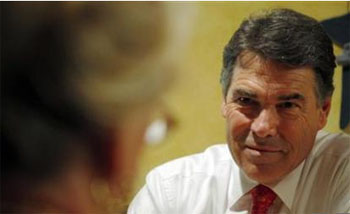
AUSTIN, Texas (Reuters) – Texas governor Rick Perry tried to sideline a state commissioner who opposed expanding the scope of a nuclear-waste landfill owned by one of the governor’s biggest political donors, Reuters has learned.
Bobby Gregory, owner of a wildlife ranch and landfill company south of Austin, had opposed a plan to let 36 states send nuclear waste to a 1,338-acre site in Andrews County.
On the other side of the issue was billionaire Harold Simmons and his company Waste Control Specialists LLC, which stood to gain millions of dollars from accepting out-of-state shipments. Simmons had donated over $1 million to Perry’s gubernatorial campaigns.
A report in the Los Angeles Times in August examined the case of the Texas waste site and Perry’s ties to Simmons, a conservative who funded the Swift Boat campaign that helped torpedo John Kerry’s presidential bid.
Perry maintains his appointments are based on merit, and Simmons is inclined to help any conservative Republican, spokespeople for the two said.
In any case, the January vote by the eight-member Texas Low-Level Radioactive Waste Disposal Compact Commission was key to the future profitability of the nuclear landfill.
Reuters has learned that late last year, after it became clear that the commission might block Waste Control’s request to truck in waste from around the country, Perry’s appointments chief, Teresa Spears, offered commissioner Gregory an alternative job — a prestigious appointment as a regent of a state university.
Under Texas law, Gregory could not hold two state-appointed positions requiring Senate approval at the same time, and so taking the regent job would have required him to leave the waste commission.
Gary Newton, a lawyer for Gregory’s company, Texas Disposal Systems, told Reuters his boss declined the offer. "There was a call from Ms. Spears. Bobby said they asked him if he was interested in this position. It was a Board of Regents position. He said ‘No, I’m not interested in that type of appointment,’ and declined," Newton said.
Gregory’s term as commissioner ended on August 31 this year, so Perry can now replace him. The waste commission voted in January to allow imports, though it still has to examine and approve specific applications to import waste on a case-by-case basis.
Perry spokeswoman Catherine Frazier said: "Governor Perry’s decisions are based solely on what’s in the best interests of the people of Texas."
The news of Perry’s intervention in the nuclear-waste issue comes as the governor is climbing the polls in the fight to take on President Barack Obama as the Republican candidate in the U.S. presidential election next year.
The Texan is running on a pro-jobs, pro-business platform. His political foes allege that he has granted favors to businesses owned by Perry donors (which wouldn’t necessarily be improper under Texas campaign-finance rules). The governor’s camp says he pushes the interests of all business in Texas.
FIGHT OVER IMPORTS
The WCS-operated site will store 2.3 million cubic feet of low-level nuclear waste, which is everything from cut up nuclear power plants, to radioactive detritus from hospitals and research labs — but not spent nuclear fuel itself.
A key issue for the economics of the nuclear waste site was whether it would be allowed to handle waste imported from states other than Vermont. Texas already had a "compact" deal to handle Vermont’s low-level waste.
In the latter part of 2010, Gregory was one of two people on the eight-member panel known to oppose allowing out of state imports. Two other members of the panel were Republican appointees from Vermont who favored the imports, but they were due to be replaced, presumably by Democratic appointees who would be in the opposition camp, early in 2011.
That could have swung the balance of the committee from 6-2 in favor to a 4-4 stalemate. Replacing Gregory would have given importation proponents the vote to carry the day.
After Gregory declined the job offer, the commission was called to vote on January 4, before the terms of the Vermont Republicans ended.
At a meeting that day, Gregory pleaded with his fellow commissioners to vote against importation.
"Without question in my mind this is too much, too soon, too fast, and I’ve added the caveat — if at all," Gregory told the meeting. "It is beyond preposterous, it is beyond absurd," that the commission should vote without reading over 5,000 public comments, he said.
The panel voted 5-2 in favor of allowing out-of-state imports, and the Texas legislature sealed the importation allowance into law in May.
The Andrews County dump could begin accepting waste late in 2011 or early in 2012.
Perry’s spokeswoman did not dispute the details of the regent offer, but would not comment on the donor’s ties to Perry or the governor’s intention to remove a waste specialist from a waste regulatory board in favor of overseeing a university. She broadly defended the process.
"Governor Perry makes appointments based on the qualifications of an individual and his or her ability to serve in Texans’ best interests, nothing more," Frazier said. "As you may know, the project you mention was approved overwhelmingly by the Texas legislature, and has the support of the local community," she added.
Simmons’ support of Perry is not unique and extends to Republican conservative candidates nationwide, said Chuck McDonald, spokesman for Waste Control Specialists, who dismissed any suggestion that Simmons’ donations had gained him any favors from Perry or state regulators.
"The record is pretty clear: If you are a conservative Republican seeking office, Mr. Simmons is going to support you," McDonald said. "Every congressman who comes dragging through Texas, if he stops in (Simmons’) office and he’s got an "R" by his name, he’s going to get money."
(Editing and additional reporting by Mark Hosenball in Washington; Editing by Claudia Parsons and Michael Williams)
This document contains copyrighted material whose use has not been specifically authorized by the copyright owner. SEED Coalition is making this article available in our efforts to advance understanding of ecological sustainability, human rights, economic democracy and social justice issues. We believe that this constitutes a "fair use" of the copyrighted material as provided for in section 107 of the US Copyright Law. If you wish to use this copyrighted material for purposes of your own that go beyond "fair use", you must obtain permission from the copyright owner.


